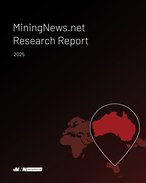This article is 7 years old. Images might not display.
Mines and Petroleum Minister Bill Johnston formally opened round 17 of the co-funded exploration drilling program today as it emerged that WA fell down the rankings in the Fraser Institute’s Annual Survey of Mining Companies.
On an investment attractiveness basis, WA dropped from third to fifth spot.
WA scored even worse in the policy perception index, falling out of the top 10 to 17th.
There’s no doubt that the WA government’s failed attempt to increase gold royalties took its toll, with the state losing 19 points over political stability and 10 points over the taxation regime.
Shadow Mines and Petroleum Minister Bill Marmion said the results painted a damning picture, driven by the government's "anti-mining decisions".
“We should be aiming to get back to number one, not heading backwards," he said.
“The McGowan government’s policy decisions are clearly hurting WA’s international reputation as an investment destination.
“The policy perception index, which reflects the performance of the McGowan government, has plummeted from ninth best in the world to 17th, which the report says is specifically due to increasing concern over political stability, socioeconomic agreements, community development conditions and taxes.”
But Johnston said it was pleasing WA continued to be recognised as one of the world’s leading resources jurisdictions.
“The interest shown by countries in Africa and Latin America in Western Australia’s regulatory regime also reinforces WA as a world leader,” he told MNN in a statement.
Johnston just returned from Cape Town where he attended Investing in African Mining Indaba.
“I have received very positive feedback for the capacity building programs conducted by DMIRS at Latin America Down Under last year and at Mining Indaba in South Africa earlier this month,” he said.
“Western Australia’s regulatory regime continues to provide a framework which increases the global competitiveness of the mining industry.
“The McGowan government continues to vigorously promote and strengthen the state’s mining sector and is currently working on refining and reintroducing the Mining Amendment Legislation – that was not progressed by the previous Liberal government.”
The 2015 bill proposed to overhaul the environmental approvals process to significantly reduce regulatory burden on tenement holders while strengthening and improving environmental management.
The Association of Mining and Exploration Companies noted that all Australian states and territories lost ground in the survey.
“The Fraser Institute Survey results reflect increased red tape, proposed royalty increases and regulatory uncertainty across Australia,” AMEC CEO Warren Pearce said.
“The geology has not changed, but government are damaging our investment attractiveness.
“Tasmania and Victoria were the worst performing Australian jurisdictions at 50 and 71 respectively on the investment attractiveness index.”
Pearce said if processes were duplicative, costly and slow, companies would invest in competing jurisdictions. Finland topped the survey, followed by Saskatchewan, Nevada and Ireland.
“AMEC is advocating for regulatory reform, and the funding of exploration incentive schemes and co-funded drilling programs to encourage greater mineral exploration and mining in Australia, and to generate significant economic returns for the economy,” said Pearce.
The Queensland Resources Council also expressed concern over Queensland's 12th-place ranking.
“Investors don’t like surprises, which is why the sector is always talking about the need for policy certainty”, QRC CEO Ian Macfarlane said.
“The Queensland government needs to be aware investors are watching every potential change in policy as having a direct impact on the investment profile of the state.
“The clear challenge in the year ahead is to deliver policy certainty that investors expect. A stable regulatory environment is the only way to see Queensland recognised as the best mining jurisdiction in the world."























